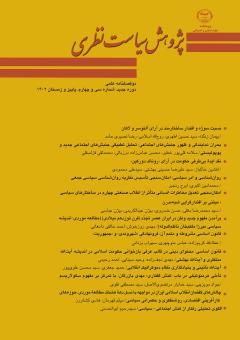آیتالله نائینی و بنیادگذاری نظام دموکراتیک انقلابی
محورهای موضوعی : پژوهش سیاست نظری
حمید جعفری
1
,
سيد محسن علويپور
2
![]()
1 - دانشجوی دکتری علوم سیاسی، پژوهشکده امام خمینی و انقلاب اسلامی
2 - دانشیار گروه مطالعات کاربردی سیاست، پژوهشگاه علوم انسانی و مطالعات فرهنگی
کلید واژه: نائینی, آرنت, آزادی مثبت, مشارکت و بنیانگذاری,
چکیده مقاله :
نائینی توانست طرح یک نظام دموکراتیک با عنوان «دولت مشروطه» را با نظریهپردازی مفاهیمی مانند قانون اساسی، مجلس ملی، شورا و لزوم مشورت با نمایندگان مردم، معنا و بارسیاسی دادن به دو اصل امربه معروف و نهی از منکر، تأکید بر دموکراسی انجمنی و نقش آنها در نظارت بر قوانین و در نهایت ابداع نظریۀ جدید در فقه سیاسی شیعه ارائه کند که اولویت آن «مصالحه نوعیه» باشد و بهواسطه آن، زمینههای فکری لازم را برای جدایی امر سیاسی از امر دینی فراهم آورد. بررسی این نظریه با ابتنا بر چارچوبهای نظری پیشگام در تحولات سیاسی در دنیا نشان میدهد که او تا چه اندازه با بنیادهای یک نظام دموکراتیک در دنیای معاصر آشنا بوده است و توانسته بود با بهرهگیری ازآموزههای دینی و مذهبی، طراحی چنین نظامی را مبتنی بر نیازهای روزآمد جامعه ایرانی صورت دهد. پژوهش حاضر بر آن است که با واکاوی اصولی که فیلسوف سیاسی معاصر، «هانا آرنت» برای یک دولت جمهوری و یک انقلاب موفق ارائه داده است، در نظریه حکومتی نائینی، مفصلبندی نوینی از چارچوبهای این نظریه به دست دهد. در این چارچوب مشخص میشود که اصل بنیانگذاری و آغازگری، تأکید بر آزادی مثبت و مشارکت شهروندانی که از لحاظ حقوقی برابر هستند، در نظریه دولت مشروع نائینی در بطن دو اصل اساسی «حریت» و «مساوات» بهخوبی مفصلبندی شده است و بر این اساس این نظریه را میتوان نظریهای پیشگام در روزآمدسازی سامان سیاسی کشور بر اساس اصول بنیادین دموکراسی در نظر آورد. روش این پژوهش، توصیفی- تحلیلی و براساس مطالعه کتابخانه ای است.
Ayatollah Naeini and the Establishment
of a Revolutionary Democratic System
Hamid Jafari*
Seyyed Mohsen Alavipour**
Naeini was able to present a proposal for a democratic system entitled "Constitutional Government" through theoretical elaboration on concepts such as the constitution, the national assembly, councils, the necessity of consulting with the people's representatives, giving meaning and political weight to the principles of enjoining good and forbidding evil, emphasizing participatory democracy, the role of councils in overseeing laws, and ultimately introducing a new theory in Shia political jurisprudence. The theory prioritizes a form of "compromise" and, through this, provides the necessary intellectual groundwork for separating political affairs from religious matters. An examination of this theory within the framework of pioneering theoretical perspectives on political developments worldwide demonstrates the extent to which he was familiar with the foundations of a democratic system in the contemporary world. By incorporating religious and cultural teachings, he was able to design such a system based on the modern needs of Iranian society. This research aims to elaborate on the novel articulation of the principles outlined by contemporary political philosopher Hannah Arendt for a republic and a successful revolution, within Naeini's governance theory. Within this framework, it becomes evident that the founding principle emphasizes positive freedom and the participation of citizens who are equal under the law. The two fundamental principles of "liberty" and "equality" are well articulated within Naeini's legitimate government theory. Therefore, this theory can be considered as pioneering in modernizing the political structure of the country based on fundamental democratic principles. The research methodology employed is descriptive-analytical and relies on library research.
Keywords: Naeini, Arendt, positive freedom, participation, and foundation.
* Ph.D. Student of political Science, Imam Khomeini and Islamic Revolution Research Institute, Iran
h.jafari848586@gmail.com
** Corresponding Author: Associate Professor, Department of Applied Policy Studies, Research Institute of Humanities and Cultural Studies, Iran
m.alavipour@gmail.com
